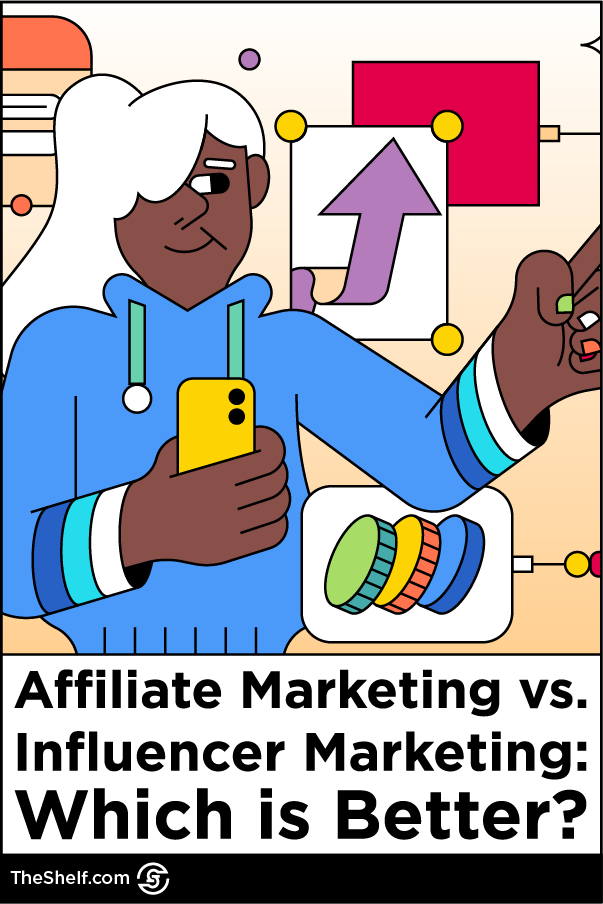If you’re looking to break out of traditional advertising models, you may want to dive into the world of affiliate vs. influencer marketing. While both approaches have some distinctions, they are generally housed in the world of social media and used to drive sales outside traditional ad models.
Both strategies allow your customers to also become your advertisers. Capitalize on word-of-mouth referrals and product testimonials by determining which social media marketing strategy is right for you. Heck, maybe your brand would benefit from both!
We’ll break down the differences between affiliate marketing and influencer marketing plus the benefits of each. And we’ll walk you through which strategy might be right for your next campaign in the paragraphs below. The world of social media marketing is your oyster. We hope this article will be your pearl.
Let’s start by defining our terms.
What is Affiliate Marketing?
Affiliate marketing is the process by which an individual outside a company, or an affiliate, markets the company’s products and gets paid on commission for the sales they drive. Similar to influencer marketing, this practice is most common on social media. Affiliates identify a product they enjoy and share an ad or link to the product on their personal social channels or website. From there, their followers can click on the link and purchase the product. Those conversions are tracked through the affiliate’s bespoke link. The affiliate is then paid a portion of the sales they drive.

Because all parties benefit, affiliate marketing represents an attractive symbiotic relationship for both affiliates and brands. The market for affiliate advertising is growing rapidly. Affiliate marketing spend in the United States crested $8.2 billion in 2022. That’s up from $5.4 billion in 2017.
There are three different types of affiliate marketing: unattached, related, and involved. Let’s dive into a quick explainer of each so you can determine which type might be best for your brand.
UNATTACHED
In the unattached model, the affiliate marketer has no attachment to the product, service, or brand they are promoting. This may mean that the product is outside of their niche and that they do not have authority in the industry. The affiliate marketer may not have ever even used the product. They simply post a link and hope people click on it.
These are low-risk, low-commitment partnerships in which the affiliate simply links to a product and does little to deep dive into the advertising or use of the product. Unattached campaigns are generally run on a pay-per-click (PPC) model. While all three models can be beneficial in the right use case, the unattached strategy is the least involved.
RELATED
Related affiliate marketing is a step up from the unattached model. Affiliates may not actually use the product they are promoting, but it does align with their niche, meaning they can speak with authority on the product. This type of affiliate marketing is common among influencers. (I know. This is the affiliate marketing section, but there’s some overlap!) Expertise in a certain niche often leads to garnering a following that trusts the affiliate’s taste and input. This authority + the following = influence.
Because the affiliate actually has some authority in the space of the product, this can lead to more targeted and successful conversion campaigns. However, there is always the risk of an affiliate recommending a less-than-stellar product since in this model they likely aren’t actually using it outside the marketing effort. While this can still result in sales for the brand, it can lead to backlash from the affiliate’s following which can damage both the affiliate and brand’s reputations.
INVOLVED
This model of affiliate marketing is the most involved, duh. In involved affiliate campaigns, the affiliate has used the product and can vouch for it from their personal experience. Like the related model, they often have established a niche and following within the vertical of the product. This means they have authority in the space and the added oomph of using and loving the product themself.
This model can deliver the most bang for your buck, but it does require added investment on the part of the affiliate and likely the brand. The affiliate must build credibility and trust with their audience within the niche, and know the product well enough to convey a genuine interest and appreciation for the product. There is less risk of customer backlash in this model since affiliates must be picky about which products they advertise. And it can lead to higher sales since affiliates can leverage their personal experience of the product rather than relying on PPC.
What is Influencer Marketing?
If you’re a regular here at The Shelf, you know influencer marketing is our bread and butter. If you’d like an in-depth explainer of all things influencer marketing, you can check out our deep dive here. All you need to know for this article is that influencer marketing is an alternative to traditional advertising that leverages influential creators on social media to speak to niche audiences. It’s a form of word-of-mouth advertising that relies on trust and strong relationships between influencers and their followers.
Basically, influencers publicize their authentic, positive experiences with products and brands and provide recommendations to their followers. It’s like going to a trusted friend for advice on what lipstick to buy, except the trusted friend is a creator whose job it is to feel like every one of their followers’ bestie. It’s taking the parasocial relationships formed over social media and applying word-of-mouth advertising tactics to them.
In summary, creators with influence (big followings) post about things they like (products, brands, services, etc.) and because they have authority within specific niches and earned trust with their audiences, these posts move the needle for the brands they partner with.
What are the Benefits of Affiliate Marketing?
For well-established brands, affiliate marketing is super easy to implement. Once you have a mechanism for creating and tracking unique affiliate links, it’s simple to track the conversions from each sale. This ease of use and the scalability it enables are huge benefits of affiliate marketing.
Increased conversions can also lead to increased site traffic. While beefing web traffic isn’t the primary goal of affiliate marketing, increased sales can lead to more website clicks. More eyeballs on your site are a benefit as well.
Another noteworthy benefit of affiliate marketing is its affordability. You only pay for tangible results. That means you only pay for conversions, not clicks or impressions. This can be a cost-effective and risk-free alternative to typical influencer marketing.
What are the Benefits of Influencer Marketing?
Working with influencers can help you build brand trust, awareness, and credibility within your niche audience. Because influencers are highly regarded authority figures within their niches, getting their vote of confidence can make a big difference for your brand.
Additionally, you have more control over the content created when working within influencer marketing. While we always advocate giving creators the creative freedom the need to make some content magic, your brand does have a Fsay and final approval on the creative they produce. You can (and should) provide influencers with a brief identifying your key takeaways and creative vision for the ad, so they can get creative within the bounds you’ve identified for your campaign. This level of targeting and control is an appealing benefit to many.
Plus, the average ROI for influencer marketing is $5.20 earned for every $1 spent. Talk about a worthwhile investment. It may be more expensive to use influencer marketing than a purely affiliate approach, but if you have the budget, it can be worth every penny.
Which is Better for My Campaign?
When deciding between affiliate and influencer marketing, it’s not always a question of either or. Often the two strategies are used in combination. This is especially true in campaigns where the primary goal is to drive sales. The name of the game in affiliate marketing is conversions. You know who is great at driving conversions? Influencers.
So, if you’re looking to get products flying off the shelves, a combination of influencer and affiliate strategies may be best. However, influencers don’t always come cheap. A worthwhile partnership with an established influencer in your niche will likely cost a healthy chunk of change. Affiliate marketing with lesser-known nano influencers or affiliates without influencing power can be a more cost-effective option.
If you’re looking to run a different type of campaign, for example brand awareness or user-generated content, it may make sense to forgo the affiliate marketing and opt for a typical influencer campaign instead.
How Can I Use Affiliate and Influencer Marketing Together?
Contrary to the title of this post, it’s not always affiliate vs. influencer marketing. Sometimes, they make a great team! As we discussed in the first section, related and involved affiliate marketing campaigns are often run using influencers as the affiliates. If your goal is conversions, your campaign could benefit from using influencers as affiliate marketers. Because influencers often have an established niche and curated followings, they can be great authority figures for advertising certain products. And the affiliate model ensures they are compensated for the conversions they drive.
An affiliate and influencer marketing combo strategy will be best suited to conversion campaigns. If your goal is to increase brand awareness, industry credibility, or web traffic, you may want to go the typical influencer marketing route and leave out the affiliate strategies. Remember, affiliates only get paid for the conversions they drive, so they should be used for conversion campaigns.
However, not all influencers may be interested in affiliate marketing. It’s important to be upfront about your partnership expectations and compensation when establishing the initial relationship with your influencers and affiliate marketers. Trust is the name of the game when it comes to social media marketing, and it’s as fundamental in your partnerships as it is in your audience.
How Can I Measure the Success of My Affiliate or Influencer Marketing Campaign?
To measure the success of any marketing campaign, you first need to establish your goals. Once you’ve set your goalposts, it’s important to track your metrics throughout and after the campaign to determine your ROI. In most affiliate campaigns, you’ll be tracking conversions. In influencer marketing campaigns, you may be tracking engagement, brand awareness, website traffic, and more.
When tracking the success of an affiliate marketing campaign, it’s essential to have a reliable way to generate and track your affiliate links. These links will be used to track the individual success of each affiliate and the overall success of the campaign. Reliable links are also essential to make sure your affiliates get paid. Remember, tracking is the name of the game.
Kick-Butt Examples of Both Approaches
Check out these examples of affiliate and influencer marketing posts driving engagement out in the wild. Will you use posts like these in your next campaign?
AFFILIATE MARKETING EXAMPLE
You won’t be surprised that we’re using an affiliate marketing example posted by an influencer. We’re The Shelf! It’s what we do! Fashion and lifestyle influencer Frankie Bridge is the queen of the affiliate marketing post. Here she models a gorgeous orange dress with the brand Warehouse UK tagged and #affiliate in the post caption. Her followers can go to the link in her bio, buy this exact dress, and Frankie will earn a commission on the sale.
There’s not a ton of finesse or creativity needed for the content itself. All she has to do is model the dress and her followers can decide if they’d like to purchase it. You’ll notice this was a carousel post, too. She wore several different outfits from different brands, each with an affiliate link followers can shop in her bio. There’s no need to feign brand loyalty. Frankie simply posts what she likes (or frankly, what she thinks will sell) and the rest is up to her followers. Of course, her sense of style and aspirational lifestyle probably help drive sales.
INFLUENCER MARKETING EXAMPLE
In contrast, this influencer post is just that, only an influencer post. There is no affiliate link in bio here. Fashion lover and my constant inspo Cole Habersham sports a Topicals shopping bag in this post and shouts them out with a tag in the caption as well.
Because we know Cole wants to get his bag and keep up the trust he’s earned with his following, we can assume he was compensated in some way for this post. Because it’s not an affiliate post, he wasn’t cut into any sales the image drove. He was likely compensated with an upfront fee, free products, or a combination of the two.
The post is a little more lived-in, a little more creative, and a little more Cole than the generic affiliate post we saw above. This is because influencers have to be more discerning with what brands they partner with for posts like these. The brands Cole posts to his grid have to align with his personal brand and offer products he actually believes in.
Get Help with All Things Affiliate and Influencer Marketing
So, which is better: affiliate marketing or influencer marketing? It depends. If your goal is conversions and you have a decent budget, it may be best to go with a combination of the two. If you’re looking to drive sales with the least amount of investment, affiliate marketing may be better. For campaigns with goals outside driving conversions, influencer marketing is likely the safer bet. The beauty of social media marketing is that there’s a lot of overlap when it comes to these tried and true strategies.
If you’d like some help determining which marketing strategy is the best for your campaign, our experts would be happy to help. Schedule a strategy call with The Shelf today and we’ll help you build the campaign of your dreams. If you have any other questions on the difference between affiliate and influencer marketing strategies and what will work best for your brand, please let us know in the comments below. We’ll get back to you with all the deets.

About This Author
Ariana Newhouse | B2B Writer
I am a freelance writer and comedian based in Los Angeles, and while making people laugh is my jam, it’s not always the company brand. So, I strive to make people feel something. My writing philosophy is collaborative, empathetic, and humanistic. At the end of the day, no matter the message, there are real people on both ends of the process.





